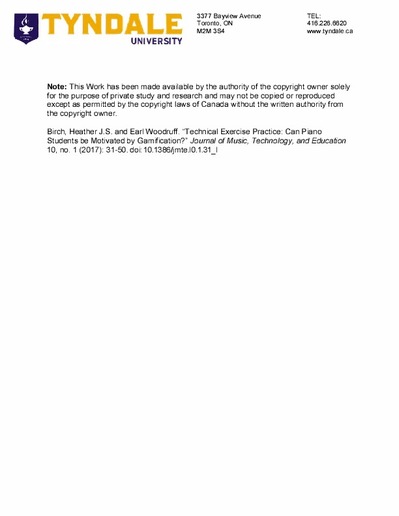| dc.rights.license | Attribution-NonCommercial-NoDerivatives 4.0 International License | en_US |
| dc.contributor.author | Birch, Heather J. S. | |
| dc.date.accessioned | 2021-04-12T19:40:09Z | |
| dc.date.available | 2021-04-12T19:40:09Z | |
| dc.date.copyright | 2017 | |
| dc.date.issued | 2017 | |
| dc.identifier.citation | Birch, Heather J. S. and Earl Woodruff. “Technical Exercise Practice: Can Piano Students Be Motivated by Gamification?” Journal of Music, Technology, and Education 10, no. 1 (2017): 31-50. Doi: 10.1386/jmte.10.1.31_1 | en |
| dc.identifier.issn | 1752-7066 | en_US |
| dc.identifier.uri | https://digitalcollections.tyndale.ca/handle/20.500.12730/542 | |
| dc.description.abstract | Gamification is a process whereby game design and game mechanics are applied in non-game contexts to influence behaviour. This research study explores the effects of gamification on young piano students' practice of technical elements such as scales, chords and arpeggios in the context of independent practice between private lessons. A control and a treatment group of ten piano students each were formed across two different private piano studios. A game-like environment was introduced for the treatment group, in which the players experienced game elements such as avatars and rewards, including points, badges and level achievements. Gamification was found to have a positive effect on the number of technical elements students mastered and a modest effect on their attitude towards practicing technical elements. The educational implications for these findings are discussed. | en_US |
| dc.format.mimetype | application/pdf/ua | en_US |
| dc.language.iso | en | en_US |
| dc.publisher | Intellect Books | en_US |
| dc.rights | Copyright, Intellect Books. All rights reserved. | en_US |
| dc.rights.uri | https://creativecommons.org/licenses/by-nc-nd/4.0/ | en_US |
| dc.subject.lcsh | Gamification | en_US |
| dc.subject.lcsh | Piano--Studies and exercises | en_US |
| dc.subject.lcsh | Piano--Study and teaching | en_US |
| dc.title | Technical Exercise Practice: Can Piano Students be Motivated by Gamification? | en_US |
| dc.type | Article | en_US |
| dc.contributor.affiliation | Tyndale University | en_US |
| dc.contributor.affiliation | OISE, University of Toronto (E. Woodruff) | en_US |
| dc.contributor.department | Department of Education | en_US |
| dc.contributor.repository | Tyndale University, J. William Horsey Library, 3377 Bayview Ave., Toronto, ON, M2M 3S4, Canada. Contact: repository@tyndale.ca | en_US |
| dc.identifier.doi | doi: 10.1386/jmte.l0.1.31_l | en_US |
| dc.identifier.issue | no. 1 | en_US |
| dc.identifier.journal | Journal of Music, Technology, and Education | en_US |
| dc.identifier.volume | 10 | en_US |
| dc.publisher.place | Bristol, UK | en_US |
| dc.rights.holder | https://www.intellectbooks.com/contact-us | en_US |
| dc.subject.keyword | Gamification | en_US |
| dc.subject.keyword | Piano--Studies and exercises | en_US |
| dc.subject.keyword | Piano--Study and teaching | en_US |
| dc.subject.keyword | Piano students | en_US |
| dc.subject.keyword | Music practice | en_US |
| dc.description.chapterpage | 31-50 | en_US |
| dc.description.note | For AODA accommodation, including help with reading this content, please contact repository@tyndale.ca | en_US |
| atmire.cua.enabled | | |


